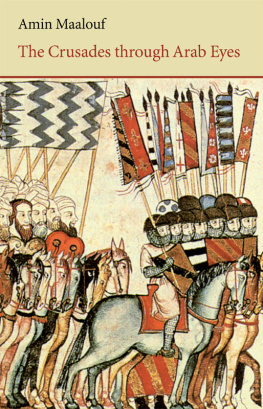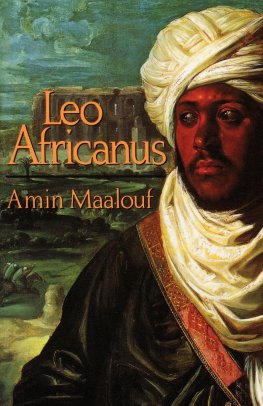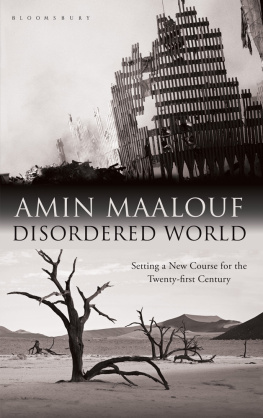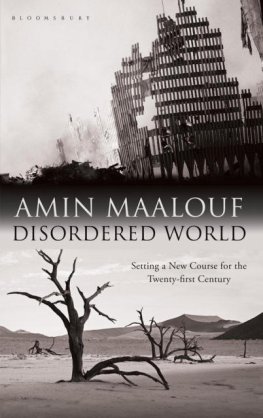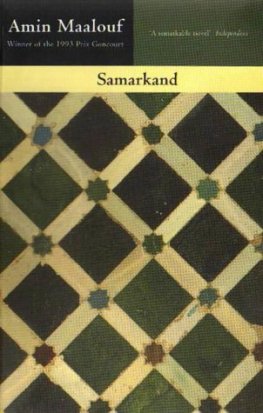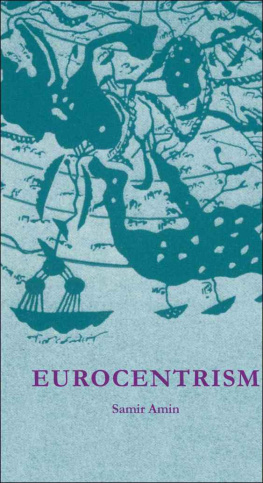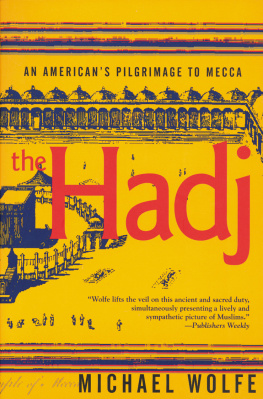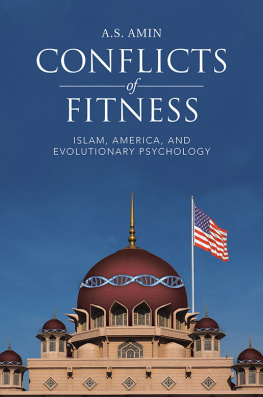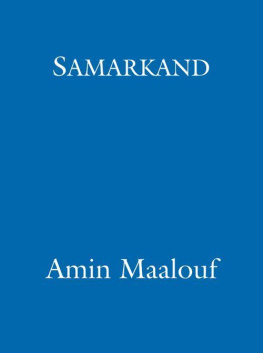Leo
Africanus
Leo
Africanus
Amin Maalouf
Translated by Peter Sluglett

For Andre
Copyright by Amin Maalouf 1986
Translation copyright by Peter Sluglett 1988
First paperback edition published in 1992 by
New Amsterdam Books
c/o Ivan R. Dee, Publisher
1332 North Halsted Street, Chicago 60622
by arrangement with W. W. Norton & Company, Inc.
Library of Congress Cataloging-in-Publication Data
Maalouf, Amin.
[Lon, lAfricain. English]
Leo Africanus/Amin Maalouf; translated by Peter Sluglett.
p. cm
Translation of: Lon, lAfricain.
ISBN 978-1-56131-022-7
1. Leo, Africanus, ca. 1492ca. 1550Fiction. 2. AfricaDiscovery and explorationFiction. I. Title.
[PQ3979.2.M28L413 1992]
843dc20
91-36145
CIP
ISBN 1-56131-022-0 (paper : alk. paper)
Manufactured in the United States of America.
Table of Contents
Yet do not doubt that I am also Leo Africanus the traveller
W.B. YEATS
18651939
I, Hasan the son of Muhammad the weigh-master, I, Jean-Leon de Medici, circumcised at the hand of a barber and baptized at the hand of a pope, I am now called the African, but I am not from Africa, nor from Europe, nor from Arabia. I am also called the Granadan, the Fassi, the Zayyati, but I come from no country, from no city, no tribe. I am the son of the road, my country is the caravan, my life the most unexpected of voyages.
My wrists have experienced in turn the caresses of silk, the abuses of wool, the gold of princes and the chains of slaves. My fingers have parted a thousand veils, my lips have made a thousand virgins blush, and my eyes have seen cities die and empires perish.
From my mouth you will hear Arabic, Turkish, Castilian, Berber, Hebrew, Latin and vulgar Italian, because all tongues and all prayers belong to me. But I belong to none of them. I belong only to God and to the earth, and it is to them that I will one day soon return.
But you will remain after me, my son. And you will carry the memory of me with you. And you will read my books. And this scene will come back to you: your father, dressed in the Neapolitan style, aboard this galley which is conveying him towards the African coast, scribbling to himself, like a merchant working out his accounts at the end of a long journey.
But is this not in part what I am doing: what have I gained, what have I lost, what shall I say to the supreme Creator? He has granted me forty years of life, which I have spent where my travels have taken me: my wisdom has flourished in Rome, my passion in Cairo, my anguish in Fez, and my innocence still flourishes in Granada.
I
The Book of Granada
The Year of Salma al-Hurra
894 A.H.
5 December 1488 14 November 1489
In that year, the sacred month of Ramadan fell in high summer. My father rarely left the house before nightfall, as the people of Granada were short-tempered during the daytime. Quarrels were frequent, and a sombre bearing was regarded as a sign of piety; only a man who was not keeping the fast could smile under the fiery heat of the sun, and only a man who had no concern for the fate of the Muslims could remain cheerful and friendly in a town exhausted from within by civil war and threatened from without by the unbelievers.
I had just been born, by the unceasing grace of the Most High, in the last days of Shaban, just before the beginning of the sacred month. My mother Salma was excused from fasting while she recovered, and my father Muhammad was dispensed from groaning, even in the hours of heat and hunger, as the birth of a son who would bear his name, and one day bear his arms, is a matter of legitimate rejoicing for every man. Furthermore, I was the first born son, and when he heard himself called Abul-Hasan, my fathers chest swelled imperceptibly; he stroked his moustache and slid his two thumbs slowly down his beard while glancing up at the alcove on the floor above, in which I lay. However, even his overwhelming joy was not as deep and intense as that of my mother Salma, who, in spite of her continuing pain and physical frailty, felt herself born again by my arrival in this world, as my birth transformed her into the first of the women of the household and assured her of my fathers continuing regard in the long years ahead.
Long afterwards, she confided to me the fears which my appearance had unwittingly assuaged, if not entirely banished. She and my father, cousins betrothed to each other since childhood, had been married for four years before she conceived, and had felt around them as early as the second year the buzzing of defamatory rumours. To the point that Muhammad came home with a beautiful Christian girl, with black braided hair, whom he had bought from a soldier who had captured her in the course of a raid into the country near Murcia. He called her Warda, set her up in a room overlooking the patio, and even talked of sending her to Ismail the Egyptian to teach her the lute, dancing and calligraphy, like any favourite of the sultans.
I was free, and she was a slave, said my mother, so we were not evenly matched. She had all the wiles of seduction at her disposal; she could go out unveiled, sing, dance, pour wine, wink her eyes, and take off her clothes, while I could never, as a wife, abandon my reserve, still less show the slightest interest in your fathers pleasures. He used to call me My cousin; he would refer respectfully to me as al-hurra, the free, or al-arabiyya, the Arab, and Warda herself showed me all the deference a servant girl owes to her mistress. But at night, she was the mistress.
One morning, went on my mother, her voice still choking with emotion in spite of all the years that had passed, Gaudy Sarah came knocking at our door. Her lips were stained with walnut root, her eyes dripping with kohl, her fingernails steeped in henna, and she was enveloped from head to toe in a riot of ancient crumpled silks which breathed sweet-smelling perfumes. She used to come to see me may God have mercy upon her, wherever she may be! to sell amulets, bracelets, perfumes made from lemon, ambergris, jasmin and water lilies, and to tell fortunes. She immediately noticed my reddened eyes, and without me having to tell her the cause of my misery, began to read my palm like the crumpled page of an open book.
Without lifting her eyes, she said these words, which I remember to this day: For us, the women of Granada, freedom is a deceitful form of bondage, and slavery a subtle form of freedom. Then, saying no more, she took out a tiny greenish stoppered bottle from her wicker basket. Tonight, you must pour three drops of this elixir into a glass of orgeat syrup, and offer it to your cousin with your own hand. He will come to you like a butterfly towards the light. Do it again after three nights, and again after seven.
When Sarah came back a few weeks later I was already having my morning sicknesses. That day I gave her all the money I had on me, a great handful of square dirhams and maravedis, and I watched her dancing with joy, swaying her hips and tapping her feet loudly on the floor of my chamber, making the coins dance in her hands, the sound of their clinking together mingling with that of the juljul, the little bell which all Jewish women had to carry.
It was indeed time that Salma became pregnant, since Providence had ordained that Warda had become pregnant already, though she had taken care to conceal her condition for her own protection. When this came to light, two months later, it became a contest as to which of them would bear a son, or, if both had sons, which would be the first to give birth. Salma was too full of apprehension to sleep, but Warda would have been quite content to give birth to a younger son, or even a daughter, since, according to our Law, the mere act of giving birth would entitle her to the status of a free woman, without having to give up the delicious frivolity which her slave origin permitted.
Next page

